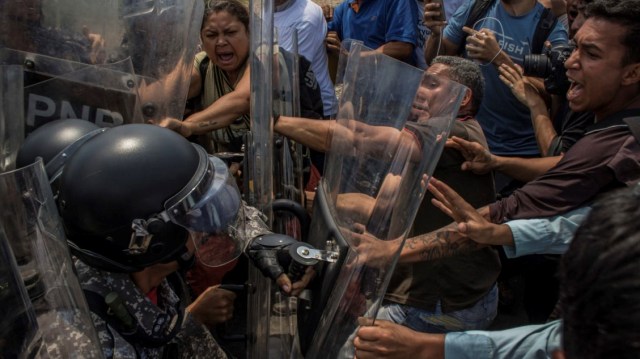
As Venezuela continues refusing to accept the findings of the FFM, let alone taking meaningful steps to implement their recommendations, the government should be put on the spot with the uncomfortable questions it’s so desperately trying to avoid. Here’s what can be done.
By Caracas Chronicles – Elisabeth Pramendorfer
Jul 15, 2021
The release of the Independent Fact-Finding Mission’s first report on Venezuela in September 2020 triggered a mix of tremendous shock and relief. Shock because the Mission had documented the full extent of the government’s systematic patterns of human rights violations and abuses over the past 6 years, which may in fact amount to crimes against humanity. Relief, because after years of similar documentation and investigations by human rights defenders across the country, an independent UN investigative body had publicly called on the Maduro government – and the international community – to ensure accountability for perpetrators, justice for victims, and to address the root causes which facilitated committing these crimes in the first place.
While the Fact-Finding Mission has a unique mandate to contribute to justice and accountability – and its investigations are of essential value for ongoing and potential future judicial proceedings, including at the International Criminal Court – its analysis should also be used beyond the Office of the Prosecutor in The Hague. The international community can – and should – also use the Mission’s findings to intensify pressure on the government to commit to broader system-wide reform.
Use FFM Information for Venezuela’s Upcoming UPR Review
In January 2022, Venezuela’s human rights record will be assessed in the context of the Universal Periodic Review (UPR), a Human Rights Council (HRC) process in which all UN member states review other governments’ adherence to the protection and promotion of human rights; each country undergoing a detailed review every 4.5 years. During Venezuela’s last review in November 2016, civil society organizations already pinpointed the areas the FFM would later investigate and report on. This includes criminalization, intimidation and harassment of human rights defenders, which the FFM called out in March 2021 (and which, as the case of Fundaredes highlights, continues to intensify); the government’s refusal to invite Special Procedures to the country (after the FFM specifically recommended it in their 2020 report, 56 governments reiterated last week the call on Venezuela to allow visits of special rapporteurs), as well as persecution of opposition leaders, activists, journalists and ordinary citizens who publicly criticize the government—which was one of the main elements of the report in September 2020, and reached a dramatic new height with the arbitrary arrest of Freddy Guevara on Monday.
In January, states at the UPR will have an opportunity to ask representatives of the Maduro government what happened with the vast set of recommendations made in 2016, and subsequently by the FFM – and amplify the calls by the Fact-Finding Mission for cross-cutting institutional change to tackle pervasive impunity, dismantle the FAES, disarm colectivos and cease collaboration with them, and hold perpetrators accountable, including those at the highest level.
While it’s highly unlikely that the Venezuelan delegation will provide answers any different than it has given to date, the UPR will be an opportunity to force the government to directly address and respond to ongoing systematic violations and abuses, which the FFM referred to as “a policy to silence opposition to the Maduro government.” As Venezuela continues refusing to accept the findings of the FFM, let alone taking meaningful steps to implement their recommendations, the government should be put on the spot with the uncomfortable questions it’s so desperately trying to avoid.
…
Read More: Caracas Chronicles – Remember the fact-finding mission on Venezuela? It’s still useful
…

